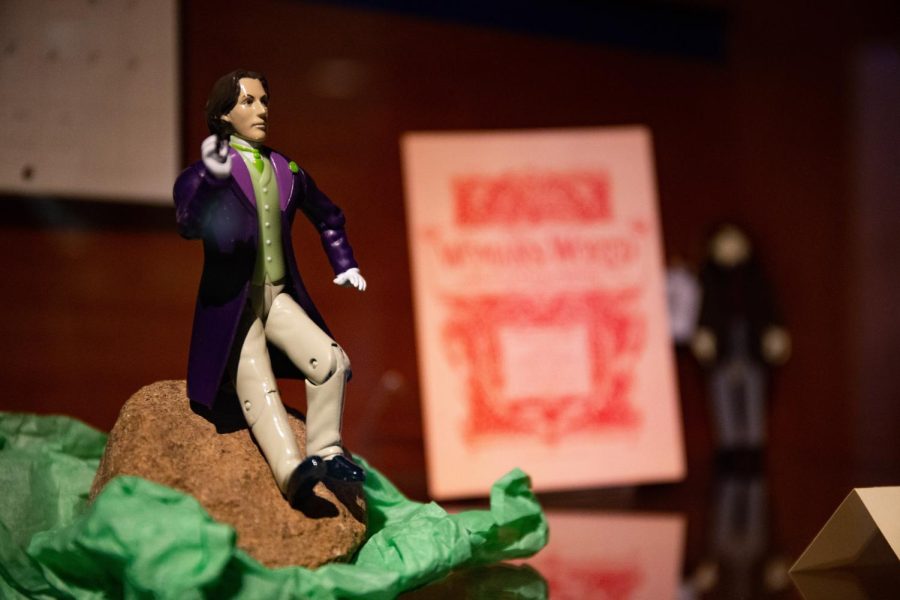[ad_1]
The life and legacy of Irish poet and playwright Oscar Wilde resonated with the students, faculty and administration of Quinnipiac University as they gathered in the Oscar Wilde exhibit at the Arnold Bernhard Library on November 30 , to celebrate the 121st anniversary of his death.
To honor Wilde, attendees read aloud his 49-stanza poem “The Reading Prison Ballad,” which he wrote about his imprisonment experience and published under his prison identification number: C33.
Since opening in March 2020, the exhibit has hosted key academic figures, including President Judy Olian and Provost Debra Liebowitz, with a chance to share a cultural experience with the students. Seven student volunteers, mostly from the Irish Studies class of history professor Christine Kinealy, attended and read aloud a passage from one of Wilde’s most powerful works.
Quinnipiac has built a history of promoting Irish antiquity through art like Wilde’s writing. Kinealy is a vivid example. She was the founding director of the Great Hunger Institute of Ireland and a frequent contributor to the Great Hunger Museum of Ireland, which controversially closed in August.

“I’m sad because… when I came to Quinnipiac in 2013, it had only been open for a year, and I came to help support the work of the museum,” Kinealy said. “What made Qunnipiac so special is that no other university in the world has what we have.”
Erika Yaverski, a history major, volunteered to be one of the readers and said she found the event a rewarding experience. Yaverski previously took Irish history with Kinealy and said she was already familiar with the piece. For Yaverski, not only to read, but to learn the history of history is equally important.
“Much of its literature was not very popular at the time (it was published),” Yaverski said. “But his experience as a gay man and the oppression he faced made his words much more powerful.”
Liebowitz said she was captivated by Wilde’s words and read the piece aloud with vigor.
“As I read, I was struck by the intensity,” Liebowitz said. “The feeling of intensity was visceral.”
Liebowitz also said that she found the historical aspect of the poem crucial for contemporary times.
“It’s really about how you help people today understand the validity and importance of the lessons that history brings,” Liebowitz said. “History is not just a book; it’s about helping us make sense of today.
The poem was about convicted murderer Charles Wooldridge who was hanged in Reading Gaol Prison in 1896. Kinealy said Wilde’s voice throughout the poem was full of compassion and empathy, although he knew that the man killed someone.
“
He has so much compassion for a man he has never met, yet he understood (man’s) situation. “
– Christine Kinealy, Director of the Great Hunger Institute of Ireland
“He has so much compassion for a man he’s never met, but he understood (the man’s) situation,” Kinealy said. “Even though we are talking about (peculiar) things about Ireland, these are universal lessons.”
Public Service Librarian Robert Young found Wilde’s words more personal.
“We’ve had shows like this in the past, but this one holds a special place in my heart because I’m gay, and I’ve always enjoyed and appreciated Oscar and what he did,” said Young said. “I’m just happy to be able to participate in this event.
According to Time Magazine, Wilde was charged and jailed for “gross indecencyFor his personal connections in 1895. This happened just five years before his untimely death at the age of 45 from meningitis.
“Not only is (Wilde) a literary genius, he paved the way for homosexuality to become an everyday conversation,” Kinealy said. “Through his suffering, it really paved the way for gay activists, (although) it took a long time.”
Wilde was also discriminated against because he is Irish, a common experience for many immigrants throughout much of the 19th century.
“Ireland is a country that has suffered a lot,” Kinealy said. “One of the great things about Ireland is its resilience.”
The great potato famine, in particular, caused poverty for thousands of Irish people. As a result, many went elsewhere to create a better life, often moving to the United States and the United Kingdom.
“Even though we are talking about (peculiar) things about Ireland, these are universal lessons,” Kinealy said. “These are not just stories of Irish immigrants, it is a story of all immigrants.”
For Olian, she said attending this event fulfills her mission as president to open the minds of students and expose them to many historical perspectives.
“(Wilde) has a lot to teach us,” said Olian. “Part of our goal at Quinnipiac is to bring as broad a perspective as possible. “
Yaverski said she wanted other students to realize the importance of studying not only Irish history, but history as a whole.
“It’s not just an isolated character. It represents a lot of oppression in Irish history as well as the oppression of the gay community, ”Yaverski said. “So I think putting this story within a larger narrative is how we can remember his legacy.”
[ad_2]
Source link

